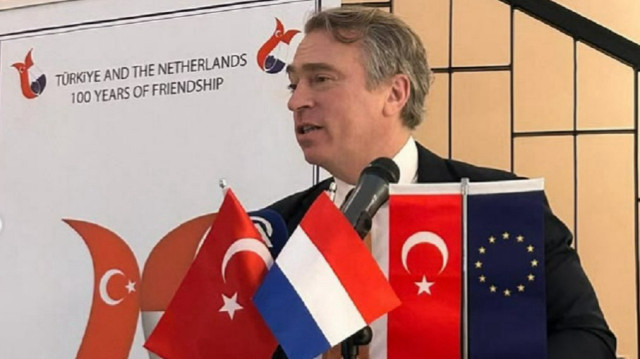
‘EU has as much interest in furthering the exchange of people as Türkiye,' Thomas Hans Ossowski, EU envoy to Ankara, tells Anadolu
- ‘We want Turkish businessmen to come to Europe. We want Turkish students to study at European universities. We want to facilitate people-to-people exchange,' says Ossowski
- EU and Türkiye have ‘very good and positive conditions to reengage with each other,' says ambassador
The EU is focusing on ironing out problems and facilitating visa access for Turkish citizens, according to its ambassador to Ankara, stressing that the bloc has as much interest in fostering the exchange of people as Türkiye.
Many Turkish citizens have been facing problems in securing visas, such as increased scrutiny of applications and months of waiting to get an appointment date, hampering essential movement of businesspeople, academics, students, and others.
“The EU has as much interest in furthering the exchange of people as Türkiye. We want Turkish businessmen to come to Europe. We want Turkish students to study at European universities, and we want to facilitate the people-to-people exchange,” Thomas Hans Ossowski, the EU envoy to Türkiye, told Anadolu.
He said diplomatic missions of EU member states are facing a “congestion problem,” but asserted that the bloc is “working on very concrete steps on how to ease the pressure on consulates and embassies of EU member states.”
Ossowski pointed out that Turkish citizens received the second-highest number of Schengen visas last year after China, reiterating that the EU is making “a major effort” to address the issue.
However, the envoy said the “falsification of documents” and “corrupt practices by private actors and agencies” are adding to the congestion, calling on the Turkish state and business associations to stop the “malpractices.”
- ‘Türkiye is a very important and trusted NATO ally'
On Donald Trump's imminent second term as US president and its implications on European security, Ossowski said Türkiye could have a “very important” role in the coming period.
During his first tenure, Trump publicly criticized European NATO allies for not meeting the alliance's defense spending target of 2% of GDP, arguing that the US was shouldering an unfair burden and threatened a complete US withdrawal.
His stance strained relations with European leaders and raised questions about the future of US commitment to transatlantic security.
“Türkiye is a very important and trusted NATO ally, and for many, many decades,” said Ossowski.
“We certainly also rely on Türkiye, as a trusted NATO ally, to contribute to our common security.”
Stressing that the EU hopes to engage “constructively” with the new Trump administration, Ossowski added: “We would like also to do this together with Türkiye because … in this international strategic situation where we are surrounded by so many crises, the EU and Türkiye have to grow closer together.”
He acknowledged that there are “several reasons why cooperation is sometimes impeded,” including the fact that “not all EU member states are recognized by Türkiye.”
“So, there are some obstacles in the way, but I believe with political wisdom, political will, and pragmatism, we can … overcome these problems,” he said.
- EU-Türkiye engagement and Ankara's role in Ukraine war
On the future of EU and Türkiye relations, Ossowski said ties between the two “remain very complex.”
“Türkiye is a candidate country. The accession negotiations are frozen for the time being, and certainly, it's not yet on the agenda to talk about that, but we want to engage very much with Türkiye on a lot of important questions, such as the modernization of the customs union and visa liberalization,” he said.
However, he emphasized that there has to be an effort from both sides.
“We need commitment, solidarity and political will on both sides. We have to do it together. Neither Türkiye nor us can do it alone,” he said.
“Recognizing the fact that Türkiye and the EU are strategic partners, and that Türkiye is a candidate country, we have, right now, very good and positive conditions to reengage with each other.”
Turning to Türkiye's role during the Russia-Ukraine war, Ossowski reiterated the bloc's appreciation for Ankara's endeavors, citing steps such as the crucial Black Sea grain deal.
With that agreement, Türkiye “very substantially contributed to avert a food crisis in the world,” he said.
Türkiye has been continuing efforts to end the Russia-Ukraine conflict, which has been raging since February 2022, urging Kyiv and Moscow to sit down for negotiations and offering mediation services.
Türkiye first hosted a meeting between the Russian and Ukrainian foreign ministers in the Mediterranean city of Antalya in March 2022.
Those efforts led to the landmark Black Sea Grain Initiative, but Moscow did not extend the agreement after July 2023, citing restrictions on Russian grain exports.
Ossowski also praised Türkiye's decision to invoke the Montreux Convention to not allow warships to navigate from the Mediterranean to the Black Sea.
Under the 1936 Montreux Convention, Türkiye controls the Istanbul and Canakkale Straits, and has the power to regulate warship transits and even close the straits to foreign ships.
At the onset of the war, Ankara closed the Turkish Straits to Russian, Ukrainian, and other countries' naval vessels.
“We are very, very grateful for the constructive contribution of Türkiye to de-escalate this war,” said Ossowski.

